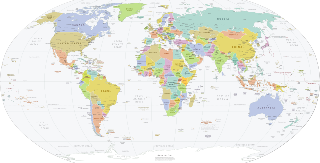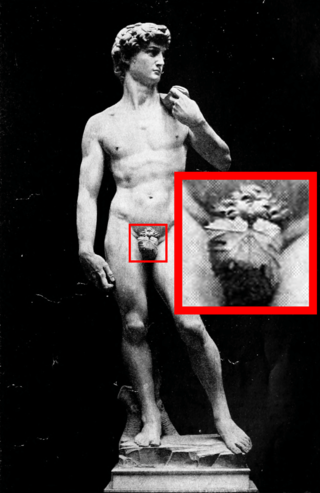Related Research Articles

A country is a distinct part of the world, such as a state, nation, or other political entity. When referring to a specific polity, the term "country" may refer to a sovereign state, states with limited recognition, constituent country, or a dependent territory. Most sovereign states, but not all countries, are members of the United Nations. There is no universal agreement on the number of "countries" in the world since several states have disputed sovereignty status, limited recognition and a number of non-sovereign entities are commonly called countries.

The International Court of Justice, or colloquially the World Court, is the only international court that adjudicates general disputes between nations, and gives advisory opinions on international legal issues. It is one of the six organs of the United Nations (UN), and is located in The Hague, Netherlands.
The Library of Congress Classification (LCC) is a system of library classification developed by the Library of Congress in the United States, which can be used for shelving books in a library. LCC is mainly used by large research and academic libraries, while most public libraries and small academic libraries use the Dewey Decimal Classification system. The classification was developed by James Hanson, with assistance from Charles Martel, in 1897, while they were working at the Library of Congress. It was designed specifically for the purposes and collection of the Library of Congress to replace the fixed location system developed by Thomas Jefferson.

The Universal Declaration of Human Rights (UDHR) is an international document adopted by the United Nations General Assembly that enshrines the rights and freedoms of all human beings. Drafted by a UN committee chaired by Eleanor Roosevelt, it was accepted by the General Assembly as Resolution 217 during its third session on 10 December 1948 at the Palais de Chaillot in Paris, France. Of the 58 members of the United Nations at the time, 48 voted in favour, none against, eight abstained, and two did not vote.

A librarian is a person who works professionally in a library providing access to information, and sometimes social or technical programming, or instruction on information literacy to users.
The American Library Association (ALA) is a nonprofit organization based in the United States that promotes libraries and library education internationally. It is the oldest and largest library association in the world.

The Georgetown University Law Center is the law school of Georgetown University, a private research university in Washington, D.C., United States. It was established in 1870 and is the largest law school in the United States by enrollment, with over 2,000 students. It frequently receives the most full-time applications of any law school in the United States.

Who's Who is a reference work. It has been published annually in the form of a hardback book since 1849, and has been published online since 1999. It has also been published on CD-ROM. It lists, and gives information on, people from around the world who influence British life. Entries include notable figures from government, politics, academia, business, sport and the arts. Who's Who 2023 is the 175th edition and includes more than 33,000 people.

HeinOnline (HOL) is a commercial internet database service launched in 2000 by William S. Hein & Co., a Buffalo, New York publisher specializing in legal materials. The company was founded in Buffalo, New York, in 1961, and is currently based in nearby Getzville, New York. In 2013, WSH Co. was the 33rd largest private company in western New York, with revenues of around $33 million and more than seventy employees.

A law library is a special library used by law students, lawyers, judges and their law clerks, historians, and other scholars of legal history in order to research the law. Law libraries are also used by people who draft or advocate for new laws, e.g. legislators and others who work in state government, local government, and legislative counsel offices or the U.S. Office of Law Revision Counsel and lobbying professionals. Self-represented, or pro se, litigants also use law libraries.

The Law Library of Congress is the law library of the United States Congress. The Law Library of Congress holds the single most comprehensive and authoritative collection of domestic, foreign, and international legal materials in the world. Established in 1832, its collections are currently housed in the James Madison Memorial Building of the Library of Congress. Law staff rely on and utilize 2.9 million volumes of primary legal sources, 102.18 million microforms, 99,000 reels of microfilm, 3.18 million pieces of microfiche, and 15,600 tangible electronic resources, making it is the largest law library in the world.

The Dag Hammarskjöld Library is a library on the grounds of the headquarters of the United Nations, located in the Turtle Bay/East Midtown neighborhood of Manhattan in New York City. It is connected to the Secretariat and Conference buildings through ground level and underground corridors. It is named after Dag Hammarskjöld, the second Secretary-General of the United Nations. The library was founded in 1946, and the current library building was completed in 1961.

Zotero is free and open-source reference management software to manage bibliographic data and related research materials, such as PDF and ePUB files. Features include web browser integration, online syncing, generation of in-text citations, footnotes, and bibliographies, integrated PDF, ePUB and HTML readers with annotation capabilities, and a note editor, as well as integration with the word processors Microsoft Word, LibreOffice Writer, and Google Docs. It was originally created at the Center for History and New Media at George Mason University and, as of 2021, is developed by the non-profit Corporation for Digital Scholarship.

The United Nations Office at Vienna (UNOV) is one of the four major office sites of the United Nations where numerous different UN agencies have a joint presence. The office complex is located in Vienna, the capital of Austria, and is part of the Vienna International Centre, a cluster of several major international organizations. UNOV was established on 1 January 1980, and was the third such complex to be created.

Michigan State University Libraries is the academic library system of Michigan State University in East Lansing, Michigan, United States. The library system comprises nine branch locations including the Main Library. As of 2021-22, the MSU Libraries ranked 26th among U.S. and Canadian research libraries by number of volumes and 7th among U.S. and Canadian research libraries by number of titles held.

Censorship is the suppression of speech, public communication, or other information. This may be done on the basis that such material is considered objectionable, harmful, sensitive, or "inconvenient". Censorship can be conducted by governments, private institutions. When an individual such as an author or other creator engages in censorship of their own works or speech, it is referred to as self-censorship. General censorship occurs in a variety of different media, including speech, books, music, films, and other arts, the press, radio, television, and the Internet for a variety of claimed reasons including national security, to control obscenity, pornography, and hate speech, to protect children or other vulnerable groups, to promote or restrict political or religious views, and to prevent slander and libel. Specific rules and regulations regarding censorship vary between legal jurisdictions and/or private organizations.

Nile University of Nigeria (NILE) is a private multidisciplinary university established in 2009 and located in Abuja, Nigeria. It is a member of the Honoris United Universities Network and accredited by the National Universities Commission. Currently, it has eight faculties and a School of Postgraduate Studies offering 34 undergraduate programs and 47 postgraduate programs.
Libraries are provided in many prisons. Reading materials are provided in almost all federal and state correctional facilities in the United States. Libraries in federal prisons are controlled by the Federal Bureau of Prisons, U.S. Department of Justice. State prison libraries are controlled by each state's own department of corrections. Many local jails also provide library services through partnerships with local public libraries and community organizations. These resources may be limited, mostly provided through government sources.

The Balme Library, established in 1948 is located on the main campus of the University of Ghana. The Balme Library was named after David Mowbray Balme, the first Principal of the University of Ghana. The Balme Library is the main library of the University of Ghana and is also the largest within the University of Ghana Library System (UGLS). It is endowed with information resources, IT infrastructure and expert staff. Since its establishment in 1948, the library has gone through successive growth with its printed book collection totaling over 400,000 volumes. The library subscribes to an increasing number of online databases including electronic journals (e-journals) and electronic books (e-books).
Indigenous librarianship is a distinct field of librarianship that brings Indigenous approaches to areas such as knowledge organization, collection development, library and information services, language and cultural practices, and education. The Encyclopedia of Library and Information Sciences states that Indigenous librarianship emerged as a "distinct field of practice and an arena for international scholarship in the late twentieth century bolstered by a global recognition of the value and vulnerability of Indigenous knowledge systems, and of the right of Indigenous peoples to control them."
References
- ↑ Doherty, Ben. "Law Library Guides: Foreign Law Guide: Country Information". University of Virginia. Retrieved 2022-10-11.
- ↑ Brennan, David. "Hoover Library: *Political Science: World Politics". McDaniel College. Retrieved 2022-10-11.
- ↑ "Reference Materials". National Oceanic and Atmospheric Administration. Retrieved 2022-10-11.
- ↑ "World statesman". Library of Congress, Washington, D.C. 20540 USA. Retrieved 2022-10-11.